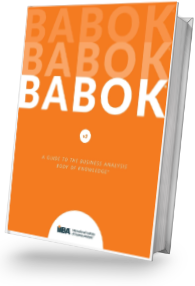Business analysis
Enabling the evolution of a business organization through clarity and understanding.
“A problem well-put is half-solved” is a famous statement made by John Dewey and you probably heard it before. Be that as it may, thanks to the artifacts of the digital revolution, we are witnessing an aggressive expansion of problem spaces for business organizations.
All too often, significant time and budgets are wasted because the problem to be solved has not been understood and clearly defined. Applying knowledge from the field of business analysis is an excellent recipe for avoiding a similar fate for your business. Indeed, business analysis is an established discipline on which there are a multitude of books and other materials.
BABOK
One of the main resources for business analysts. It provides comprehensive guidelines, best practices and insights to enhance business analysis efficacy.

Software Requirements
This book bridges the gap between stakeholders and developers, ensuring successful software project outcomes.

Visual Models for Software Requirements
This guide revolutionizes software development by utilizing visual models. A powerful tool for bridging the understanding gap between business stakeholders and developers.

Writing Effective Use Cases
If you are involved in the software development process, this book is an important resource that can help you communicate software requirements to stakeholders and improve the quality of your software.

Nevertheless, we would like to highlight the four specific features of Logeecom’s approach to business analysis that have increased the efficiency and effectiveness of the process.
Going beyond the original customer requirements
Requirement specifications from customers are part of our daily routine. They come in many different forms, vary in detail and also differ in other relevant quality parameters. We see it as our responsibility to go beyond these initial specifications to achieve a satisfactory level of understanding and clarity of the requirements themselves but also of any relevant environmental factors that might affect the solution design or any other subsequent phase of work.
Integrate agility into the process
In most cases, the objective complexity of a problem area requires an appropriate degree of flexibility to be embedded in the business analysis process. It is advisable to follow certain best practices listed in the relevant literature, but improvisation is sometimes required to overcome the challenges that arise within the process.
Strong focus on effective communication
Simply put, without the use of certain effective communication techniques, it would be difficult, if not impossible, to carry out most of our business analysis tasks. Good understanding is based on good communication, PERIOD.
Staying out of the box
Easier said than done, right? This is an important ongoing struggle in each business analysis endeavor. Applying first principles thinking, actively stimulating System 2 thinking (nice read: “Thinking, Fast and Slow” by Daniel Kahneman), using the outside looking in mode… These are the mental tools we use for “deboxing.” The results are not guaranteed, but very often, this kind of approach brings surprising new perspectives to a problem space.
The art of complexity reduction

“The world around us is extremely complex, and it’s no secret that complexity reduction is one of the most crucial evolutionary traits for the survival of living organisms. In my opinion, this same trait is essential for both individuals and organizations within the modern business environment. The art of reducing complexity plays a pivotal role in driving innovation and productivity. It’s a delicate balance to maintain, as distilling multifaceted issues into more manageable components allows for a clear, uncluttered vision, thereby facilitating the successful execution of business initiatives. At Logeecom, we place special emphasis on expanding our understanding in the area of complex systems, as it directly impacts our capabilities in several knowledge areas, including business analysis. It is also gratifying for me personally to be able to align my personal passion with my daily work goals.”
 Dejan ĐokovićBusiness AnalystLogeecom Belgrade
Dejan ĐokovićBusiness AnalystLogeecom BelgradePartnerships based on understanding
Mutual understanding of each other’s wider business context is an important step toward establishing a strong foundation for long-lasting cooperation.

Logeecom’s team exhibits technical prowess and deep understanding of our unique needs as a large legal group. They offer customized solutions for increased efficiency and proactive problem-solving. Overall, I can recommend Logeecom as a competent and reliable IT partner. In addition, the collaboration is fun.

FAQ
In our FAQ section, we strive to provide answers to some of the most common and interesting questions that may be relevant to the visitors of this site. Our ambition to eliminate (or at least reduce) pollution from information overload is our guiding principle for online and offline communication and is scrupulously adhered to in this area as well.
What are the budgeting and cost control measures related to the business analysis (BA) engagement?
Budgeting for business analysis can be challenging due to the specific nature of the activities involved. Depending on the type of project, business analysis can be an isolated phase or part of an agile or iterative process. At Logeecom, we provide a ballpark estimate based on the client’s initial input and previous experience with similar projects to give clients an idea of the budget required. We also work with our clients to establish reporting routines that meet their controlling needs.
What is the impact of AI technology on the process of business analysis?
The research and conceptualization phase of business analysis has already been greatly impacted by AI technology. With advanced machine learning algorithms and natural language processing capabilities, AI tools can help business analysts identify patterns and trends in large datasets, enabling them to gain deeper insights and make more informed decisions. AI-powered virtual assistants can also help develop concepts and test hypotheses, making the research and conceptualization phase more efficient and effective. Overall, the use of AI in this phase of business analysis can lead to better decision-making and a more accurate understanding of customer needs and preferences.
How is the complexity of knowledge transfer managed in your process?
Effective knowledge transfer is crucial for successful project execution. At Logeecom, we believe that communication and documentation techniques are essential to achieve this goal. Our communication modeling process takes into account all foreseeable aspects of future collaboration and includes continuous optimization routines that result in a concise document explaining the communication process. To avoid common documentation pitfalls, we model our documentation process during customer onboarding.